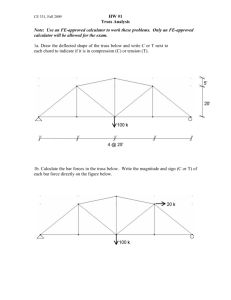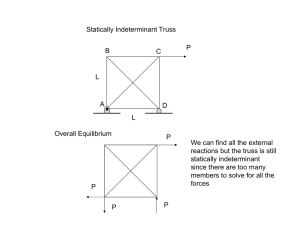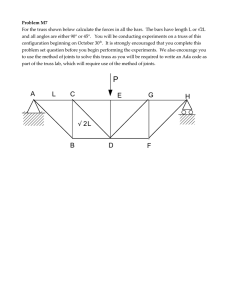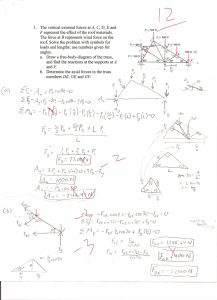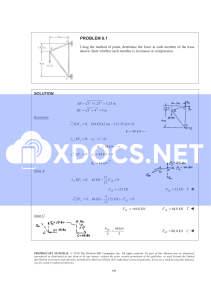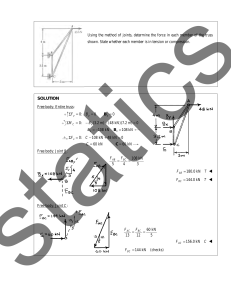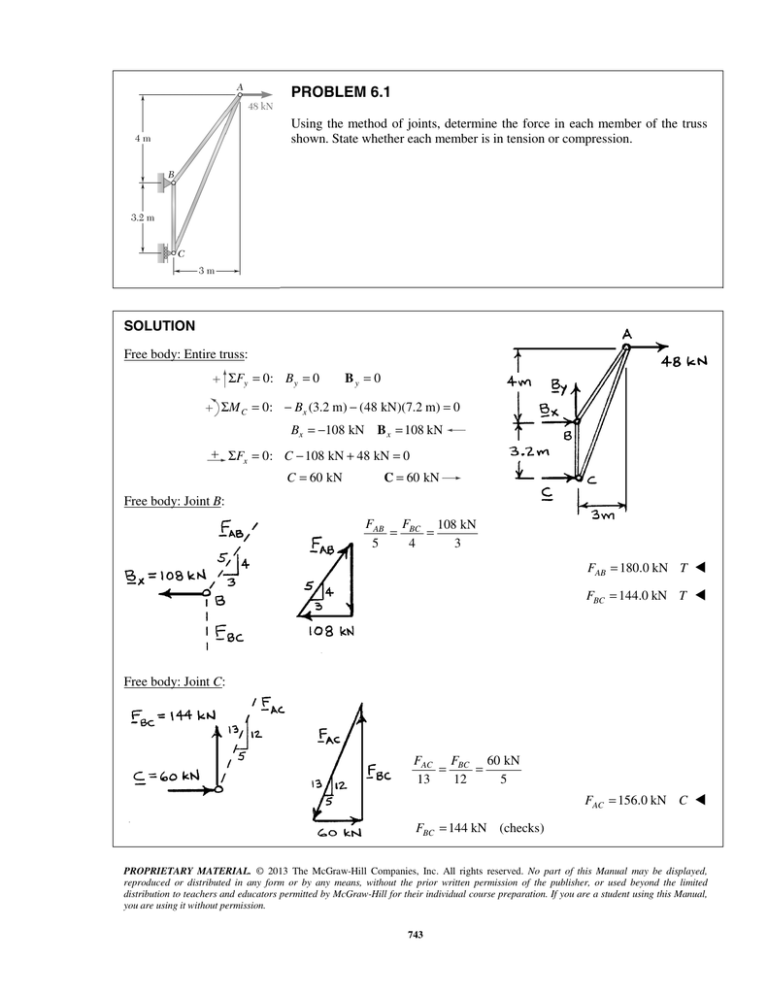
PROBLEM 6.1
Using the method of joints, determine the force in each member of the truss
shown. State whether each member is in tension or compression.
SOLUTION
Free body: Entire truss:
ΣFy = 0: By = 0
By = 0
ΣM C = 0: − Bx (3.2 m) − (48 kN)(7.2 m) = 0
Bx = −108 kN B x = 108 kN
ΣFx = 0: C − 108 kN + 48 kN = 0
C = 60 kN
C = 60 kN
Free body: Joint B:
FAB FBC 108 kN
=
=
5
4
3
FAB = 180.0 kN T
FBC = 144.0 kN T
Free body: Joint C:
FAC FBC 60 kN
=
=
13
12
5
FAC = 156.0 kN C
FBC = 144 kN (checks)
PROPRIETARY MATERIAL. © 2013 The McGraw-Hill Companies, Inc. All rights reserved. No part of this Manual may be displayed,
reproduced or distributed in any form or by any means, without the prior written permission of the publisher, or used beyond the limited
distribution to teachers and educators permitted by McGraw-Hill for their individual course preparation. If you are a student using this Manual,
you are using it without permission.
743
PROBLEM 6.11
Determine the force in each member of the Pratt roof
truss shown. State whether each member is in tension
or compression.
SOLUTION
Free body: Truss:
ΣFx = 0: Ax = 0
Due to symmetry of truss and load,
Ay = H =
1
total load = 21 kN
2
Free body: Joint A:
FAB FAC 15.3 kN
=
=
37
35
12
FAB = 47.175 kN FAC = 44.625 kN
FAB = 47.2 kN C
FAC = 44.6 kN T
Free body: Joint B:
From force polygon:
FBD = 47.175 kN, FBC = 10.5 kN
FBC = 10.50 kN C
FBD = 47.2 kN C
PROPRIETARY MATERIAL. © 2013 The McGraw-Hill Companies, Inc. All rights reserved. No part of this Manual may be displayed,
reproduced or distributed in any form or by any means, without the prior written permission of the publisher, or used beyond the limited
distribution to teachers and educators permitted by McGraw-Hill for their individual course preparation. If you are a student using this Manual,
you are using it without permission.
758
PROBLEM 6.11 (Continued)
Free body: Joint C:
ΣFy = 0:
3
FCD − 10.5 = 0
5
ΣFx = 0: FCE +
FCD = 17.50 kN T
4
(17.50) − 44.625 = 0
5
FCE = 30.625 kN
Free body: Joint E:
DE is a zero-force member.
FCE = 30.6 kN T
FDE = 0
Truss and loading symmetrical about cL .
PROPRIETARY MATERIAL. © 2013 The McGraw-Hill Companies, Inc. All rights reserved. No part of this Manual may be displayed,
reproduced or distributed in any form or by any means, without the prior written permission of the publisher, or used beyond the limited
distribution to teachers and educators permitted by McGraw-Hill for their individual course preparation. If you are a student using this Manual,
you are using it without permission.
759
PROBLEM 6.30
Determine whether the trusses of Problems 6.31b, 6.32b, and 6.33b are simple trusses.
SOLUTION
Truss of Problem 6.31b:
Starting with triangle CGM and adding two members at a time, we obtain
successively joints B, L, F, A, K, J, then H, D, N, I, E, O, and P, thus completing
the truss.
Therefore, this truss is a simple truss.
Truss of Problem 6.32b:
Starting with triangle ABC and adding two members at a time, we obtain
successively joints E, D, F, G, and H, but cannot go further. Thus, this truss
is not a simple truss.
Truss of Problem 6.33b:
Starting with triangle GFH and adding two members at a time, we obtain
successively joints D, E, C, A, and B, thus completing the truss.
Therefore, this is a simple truss.
PROPRIETARY MATERIAL. © 2013 The McGraw-Hill Companies, Inc. All rights reserved. No part of this Manual may be displayed,
reproduced or distributed in any form or by any means, without the prior written permission of the publisher, or used beyond the limited
distribution to teachers and educators permitted by McGraw-Hill for their individual course preparation. If you are a student using this Manual,
you are using it without permission.
797
PROBLEM 6.45
A Warren bridge truss is loaded as shown. Determine the force in
members CE, DE, and DF.
SOLUTION
Free body: Truss:
ΣFx = 0: k x = 0
ΣM A = 0: k y (62.5 ft) − (6000 lb)(12.5 ft)
− (6000 lb)(25 ft) = 0
k = k y = 3600 lb
ΣFy = 0: A + 3600 lb − 6000 lb − 6000 lb = 0
A = 8400 lb
We pass a section through members CE, DE, and DF and use the
free body shown.
ΣM D = 0: FCE (15 ft) − (8400 lb)(18.75 ft)
+ (6000 lb)(6.25 ft) = 0
FCE = +8000 lb
ΣFy = 0: 8400 lb − 6000 lb −
FCE = 8000 lb T
15
FDE = 0
16.25
FDE = +2600 lb
FDE = 2600 lb T
ΣM E = 0: 6000 lb (12.5 ft) − (8400 lb)(25 ft)
− FDF (15 ft) = 0
FDF = −9000 lb
FDF = 9000 lb C
PROPRIETARY MATERIAL. © 2013 The McGraw-Hill Companies, Inc. All rights reserved. No part of this Manual may be displayed,
reproduced or distributed in any form or by any means, without the prior written permission of the publisher, or used beyond the limited
distribution to teachers and educators permitted by McGraw-Hill for their individual course preparation. If you are a student using this Manual,
you are using it without permission.
821
PROBLEM 6.57
A Polynesian, or duopitch, roof truss is loaded as
shown. Determine the force in members DF, EF,
and EG.
SOLUTION
Free body: Truss:
ΣFx = 0: N x = 0
ΣM N = 0: (200 lb)(8a ) + (400 lb)(7a + 6a + 5a )+(350 lb)(4a ) + (300 lb)(3a + 2a + a ) − A(8a ) = 0
A = 1500 lb
ΣFy = 0: 1500 lb − 200 lb − 3(400 lb) − 350 lb − 3(300 lb) − 150 lb + N y = 0
N y = 1300 lb N = 1300 lb
We pass a section through DF, EF, and EG, and use the free body shown.
(We apply FDF at F.)
ΣM E = 0: (200 lb)(18 ft) + (400 lb)(12 ft) + (400 lb)(6 ft) − (1500 lb)(18 ft)
18
FDF (4.5 ft) = 0
−
182 + 4.52
FDF = −3711 lb
FDF = 3710 lb C
ΣM A = 0: FEF (18 ft) − (400 lb)(6 ft) − (400 lb)(12 ft) = 0
FEF = 400 lb T
FEF = +400 lb
ΣM F = 0: FEG (4.5 ft) − (1500 lb)(18 ft)+(200 lb)(18 ft) + (400 lb)(12 ft) + (400 lb)(6 ft) = 0
FEG = +3600 lb
FEG = 3600 lb T
PROPRIETARY MATERIAL. © 2013 The McGraw-Hill Companies, Inc. All rights reserved. No part of this Manual may be displayed,
reproduced or distributed in any form or by any means, without the prior written permission of the publisher, or used beyond the limited
distribution to teachers and educators permitted by McGraw-Hill for their individual course preparation. If you are a student using this Manual,
you are using it without permission.
833

